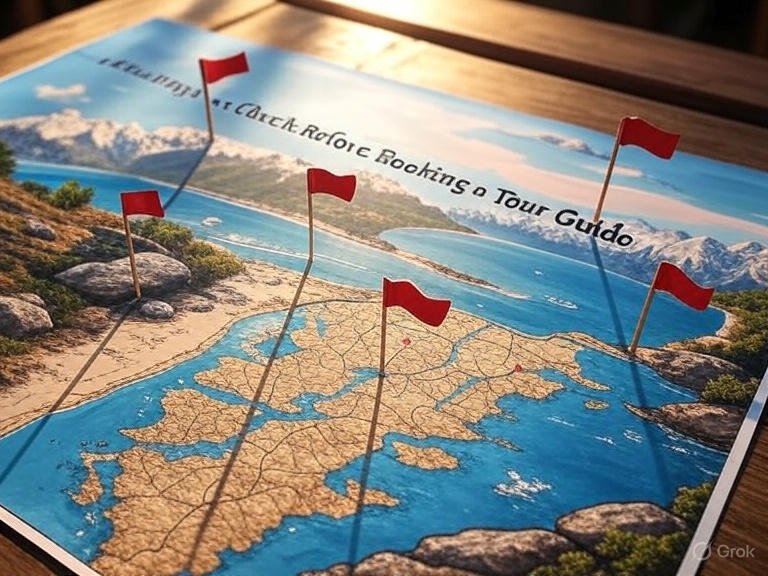Traveling is fun. You see new places, meet people, and learn stories. A good tour guide makes your trip special. They know the best spots and keep you safe. But a bad guide can make your trip sad or stressful. This article shares 11 signs to watch for before picking a guide. It also tells you what to do if you pick the wrong one. Warren Driscoll, a travel expert with over seven years exploring luxury destinations like Ibiza and the French Alps, wrote this. His honest tips and real stories help you plan a great trip.
Why a Good Tour Guide Matters
A tour guide is like a friend who knows everything about a place. They tell you about history, food, and secret spots. They make sure you don’t get lost or miss anything. A bad guide can ruin your trip. You might miss important places or feel unsafe. For example, a traveler in Peru hired a guide who didn’t know Machu Picchu’s history. The trip felt empty. Checking a guide carefully helps you have a happy, safe adventure.
How a Bad Guide Hurts Your Trip
A wrong guide can cause big problems. They might not know facts, so you learn wrong things. They could be late, making you miss sights. Some guides take you to shops to make money, not to fun places. Safety is a big worry too. A guide in Thailand led a group to a risky area, scaring everyone. These issues waste your time and money. Knowing warning signs helps you pick a better guide.
11 Red Flags to Check Before Booking a Tour Guide

Look for these 11 signs before you choose a guide. They help you avoid a bad experience. Each sign is simple to spot if you know what to look for.
1. No License or Training
Many places, like Italy or Peru, require guides to have a license. A license shows they studied the area’s history and rules. If a guide has no license, they might not know enough. Ask to see their license or check with a tourism board. A traveler in Egypt hired an unlicensed guide who gave wrong pyramid facts. This made the trip less special.
2. No Reviews or Strange Reviews
Good guides have reviews on sites like TripAdvisor or Google. Reviews tell you if they’re nice and know their stuff. Look for real stories from travelers. Be careful if there are no reviews or only perfect ones with no details. In Greece, a traveler picked a guide with no reviews. The guide was rude and rushed them, ruining the day.
3. Unclear Plans
A good guide gives a clear plan of where you’ll go. It should list places, times, and activities, like “visit a quiet beach in Ibiza at 10 a.m.” Vague plans like “see cool stuff” are a bad sign. They show the guide might not care. Ask for a written plan before you pay. A traveler in Japan got a vague plan and missed a famous temple.
4. Bad Communication
A guide should answer your questions fast and clearly. If they ignore you or give short answers, it’s a problem. Try asking about local food or history to test them. A traveler in Morocco asked about a souk, but the guide said, “It’s fine, don’t worry.” The tour was messy and confusing.
5. Pushy or Cheap Deals
Some guides push you to book fast with super low prices. This can mean bad service or extra fees later. A guide in Bangkok offered a cheap tour but charged extra for boat rides. Always ask for all costs in writing. If they push too hard, find someone else.
6. Cash-Only with No Receipt
Good guides take credit cards or use apps like Viator for safe payments. Cash-only deals with no receipt are risky. You might lose money if something goes wrong. A traveler in Marrakech paid cash to a guide who didn’t show up the next day. Always ask for a receipt and use safe payment methods.
7. Bad Reviews That Repeat
Check one- and two-star reviews. If many say the guide is late or rude, believe them. A guide in Rome had reviews about skipping sites. Travelers who ignored them missed the Colosseum. Read reviews on different sites to be sure they’re real.
8. No Excitement
A great guide loves their job. They talk about their city with joy. If a guide seems bored or tired, your tour might be dull. A traveler in Kyoto had a guide who read from a paper with no energy. Ask about their favorite place to see if they’re excited.
9. No Clear Refund Rules
Professional guides have rules for canceling or getting money back. If they don’t share these, it’s a warning. Ask for refund rules in writing before you book. A group in Athens lost money because their guide had no refund policy and canceled last minute.
10. Ignoring Safety
A good guide knows safety rules, like safe paths or emergency numbers. If they don’t talk about safety, it’s a big problem. In a jungle tour in Costa Rica, a guide took a risky path with no first-aid kit. Ask about safety plans before you go.
11. Too Cheap Prices
Very low prices can mean a bad guide. They might not know much or skip important places. A traveler in Bali paid little for a guide who didn’t speak English well. Compare prices on sites like GetYourGuide to find fair costs.
What to Do If You Pick the Wrong Guide
If you hire a bad guide, don’t worry. You can fix things to save your trip. Here are steps to take, based on real stories.
Step 1: Talk to the Guide
Tell the guide what’s wrong in a kind way. Say what you want, like “Can we spend more time at this temple?” Sometimes, they can change. A traveler in India asked their guide to slow down. The guide listened, and the trip got better.
Step 2: Contact the Booking Company
If you booked through a site like Viator or a local agency, call or email them. Explain the problem, like a guide being late or rude. Show proof, like texts or photos. A group in Portugal got a new guide after complaining to their agency.
Step 3: Keep Proof
Write down what happens, like times the guide was late. Take pictures or videos if the guide skips places or acts badly. This helps when you ask for a refund. A traveler in Morocco used photos to show a guide took them to shops, not sites, and got money back.
Step 4: Find a New Guide
If the guide doesn’t fix things, find a new one. Check apps like GuruWalk for last-minute guides. Ask hotel staff for trusted names. A traveler in Peru left a bad guide and found a great one through their hotel, making the trip fun again.
Step 5: Write a Review
After your trip, write a clear review on TripAdvisor or Google. Say what went wrong, like “The guide skipped two stops.” This helps other travelers. A review about a bad guide in Mexico helped others avoid the same mistake.
Step 6: Report Big Problems
If the guide was unsafe or lied, tell the local tourism board. Show your proof. This stops the guide from hurting others. A traveler in Thailand reported a guide who left them in a bad area. The tourism board investigated.
How to Pick a Great Tour Guide
To avoid a bad guide, follow these steps to find a good one:
- Check Reviews: Look at TripAdvisor or Google for real traveler stories.
- Ask for Licenses: Make sure the guide has training or a badge, especially in places like Egypt or Japan.
- Talk First: Email or call the guide. Ask about their favorite local spot to test their knowledge.
- Get a Clear Plan: Ask for a written list of places and times.
- Use Safe Sites: Book through trusted sites like GetYourGuide or Context Travel.
- Ask Locals: Hotel workers or café staff often know the best guides.
- Learn More: For detailed tips on picking a guide, explore how to find a trusted tour guide to ensure a great choice.
Stories That Teach Us
Real stories show why picking the right guide matters. They also show how to fix mistakes.
- Anna in Bali: Anna booked a cheap guide online. He spoke little English and skipped a temple. She asked her hotel for a new guide, who showed her hidden rice fields. Lesson: Check language skills and ask locals for help.
- Mark in Morocco: Mark’s guide took him to shops, not cultural sites. He lost $500. He contacted the agency, got a refund, and hired a certified guide. Lesson: Use safe payment methods and report issues fast.
- Lila in Rome: Lila’s guide had no license and gave wrong history facts. She left a review, helping others avoid him. She used a map app to explore alone and loved it. Lesson: Check credentials and have backup plans.
Making Your Trip Amazing
A good guide makes your trip special. They share stories, like a secret café in Paris or a mountain view in the Alps. They keep you safe and happy. To make your trip great, mix guided tours with exploring alone. Use guides for hard places, like old ruins. For easy spots, like city parks, try maps or apps. This way, you get the best of both.
Conclusion
Picking the wrong tour guide can make your trip stressful. You might miss places, lose money, or feel unsafe. By watching for signs like no license, bad reviews, or vague plans, you can choose better. If you pick a bad guide, talk to them, contact the agency, or find a new one. Warren Driscoll’s experience shows that careful planning makes travel fun and safe. Before your next trip, use these tips to find a guide who makes your adventure amazing.
Disclaimer: This article is for travel tips only. It shares general ideas to help you choose a tour guide. We are not responsible for any problems, losses, or bad experiences you may have on your trip. Always check details and make your own careful choices before booking.
Explore More
Tour Guide Scams Every Traveler Must Know (2025 Update)

Warren Driscoll writes about luxury travel. He has over seven years of experience. Since 2018, he has stayed in private villas in Ibiza and Saint-Tropez, and chalets in the French Alps. Warren’s stories have been shared by Indvidual Magazine. He writes honest reviews and gives helpful tips to help people plan great holidays. He also shares his own photos and real experiences to make his advice clear and useful.
